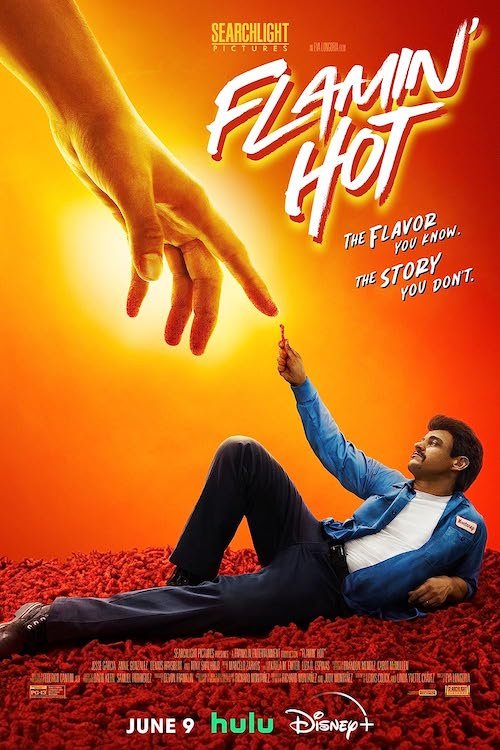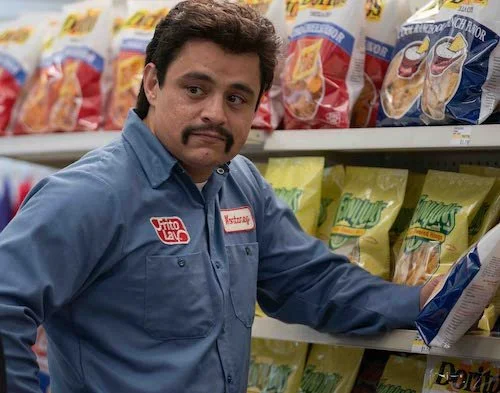Flamin' Hot
Written by Andreas Babiolakis
Eva Longoria’s Flamin’ Hot was one of many films I caught last year that I didn’t review because I didn’t put much stock into it, but I try to have reviews of every Academy Award-nominated film, and in the same way Mariah Carey defrosts around the holidays, so does Diane Warren when it comes to the will-they-won’t-they flirtations of the Academy Awards (Warren has been nominated thirteen times before, and has been nominated five years in a row, but has zero wins outside of last year’s honorary Oscar). So I have a feeling Flamin’ Hot will be nominated in typical Diane Warren fashion (especially since the song she penned, “The Fire Inside”, is being predicted by many pundits as one of the final nominations for Best Original Song). So, here we are: a very late review of Flamin’ Hot well past its sell-by date. The hype surrounding this feel-good “true story” has all but died down.
I won’t get into the factual inaccuracies, because there have been enough keys pressed surrounding this subject matter. Instead, I’ll just reiterate the gist of the film. Richard Montañez has been entangled in controversy his entire life, mainly being around the wrong people and trying to get by while broke. He winds up at Frito-Lay after his best efforts to separate himself from bad seeds and the constant struggle, but he seems to be destined to be a janitor while there. He tries to follow the motto of Frito-Lay CEO Roger Enrico: to think like a CEO and push one’s self to the limit of who one can be. Meanwhile, Frito-Lay is struggling itself and needs that one winning idea that will pull them out of the brink of bankruptcy. As Richard wants to lead a better life himself and he can find a way to save the company whilst saving himself, it’s time to get brainstorming. He eventually thinks about his Mexican roots and family (we see him meeting and marrying his sweetheart, Judy, and get to know their children as well) when he spots his son enjoying spicy food (it “burns good”). Eureka! The idea for Flamin’ Hot Cheetos is born! Will this creation rescue Frito-Lay? Will it help Richard and his family? I think we all know how this story ends even before Flamin’ Hot came out.
Flamin’ Hot means well, but it also hits false notes to get by.
Longoria wants to make a feel-good film with Flamin’ Hot, but it uses some artificiality to get by (and I’m not talking about factual inaccuracies, again). After the first chapter of Richard’s rough life, the film mainly feels like a nonstop, crowd-pleasing, underdog tale that doesn’t take any risks. It just doesn’t move along nicely, especially when you see where Richard came from and what he’s trying to save his family from. We know this guy is a nice guy. An entire two-thirds of a film reinforcing this to us isn’t really the best way to go about this. Instead, I think some legitimate seriousness would help the film out so we can see Richard continue to overcome (as opposed to the hurdles we do see that we just know Richard will clear). I like optimism as well, but a majority of a film coasting by on an obvious outcome that it doesn’t even pretend to challenge makes a film that is meant to inspire feel dull. How can we be sparked when there’s no spark in the film itself? In the same way that Flamin’ Hot Cheetos are meant to “burn good”, this film could have done with some spice (or at least some flavouring of some sort). I applaud Longoria for having a vision with this film and sticking with it (believe me, many actors-turned-directors don’t really know what they’re doing), but maybe for her next film she needs to shake things up a bit. We like underdog stories because we admire the uphill battles they conquer; Longoria builds an escalator for Richard and expects us to worry about whether or not he’ll make it to the top. Flamin’ Hot has charm and is fun, but it is also — as can be seen outside of this Oscars buzz surrounding Diane Warren’s song (yet again) — quite forgettable. Flamin’ Hot will make you laugh and feel invigorated in the moment, mind you.
Andreas Babiolakis has a Masters degree in Film and Photography Preservation and Collections Management from Toronto Metropolitan University, as well as a Bachelors degree in Cinema Studies from York University. His favourite times of year are the Criterion Collection flash sales and the annual Toronto International Film Festival.






